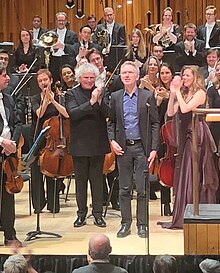
Louis Joseph Andriessen was a Dutch composer, pianist and academic teacher. Considered the most influential Dutch composer of his generation, he was a central proponent of The Hague school of composition. Although his music was initially dominated by neoclassicism and serialism, his style gradually shifted to a synthesis of American minimalism, jazz and the manner of Stravinsky.

The War Requiem, Op. 66, is a British choral and orchestral composition by Benjamin Britten, composed mostly in 1961 and completed in January 1962. The War Requiem was performed for the consecration of the new Coventry Cathedral, which was built after the original fourteenth-century structure was destroyed in a World War II bombing raid. The traditional Latin texts are interspersed, in telling juxtaposition, with extra-liturgical poems by Wilfred Owen, written during World War I.

The Boston Symphony Orchestra (BSO) is an American orchestra based in Boston. It is the second-oldest of the five major American symphony orchestras commonly referred to as the "Big Five". Founded by Henry Lee Higginson in 1881, the BSO performs most of its concerts at Boston's Symphony Hall and in the summer performs at Tanglewood.

Stuart Oliver Knussen was a British composer and conductor.

Esa-Pekka Salonen is a Finnish conductor and composer. He is the music director of the San Francisco Symphony and conductor laureate of the Los Angeles Philharmonic, Philharmonia Orchestra in London and the Swedish Radio Symphony Orchestra.

Hans Abrahamsen is a Danish composer born in Kongens Lyngby near Copenhagen. His Let me tell you (2013), a song cycle for soprano and orchestra, was ranked by music critics at The Guardian as the finest work of the 21st-century. His opera The Snow Queen was commissioned and premiered by the Royal Danish Theatre in 2019.

The Edison Award is an annual Dutch music prize awarded for outstanding achievements in the music industry. It is comparable to the American Grammy Award. The Edison award itself is a bronze replica of a statuette of Thomas Edison, designed by the Dutch sculptor Pieter d'Hont. It is one of the oldest music awards in the world, first presented in 1960 at the inaugural Grand Gala du Disque.

The Nordic Council Music Prize is awarded annually by NOMUS, the Nordic Music Committee. Every two years it is awarded for a work by a living composer. In the intervening years it is awarded to a performing musician or ensemble.

Ophelia, a character in William Shakespeare's drama Hamlet, is often referred to in literature and the arts, often in connection to suicide, love, and/or mental instability.

Andris Nelsons is a Latvian conductor. He is currently music director of the Boston Symphony Orchestra and Gewandhauskapellmeister of the Leipzig Gewandhaus Orchestra. He was previously music director of the Latvian National Opera, chief conductor of the Nordwestdeutsche Philharmonie, and music director of the City of Birmingham Symphony Orchestra.
Michel van der Aa is a Dutch composer of contemporary classical music.
Paul Anthony Griffiths is a British music critic, novelist and librettist. He is particularly noted for his writings on modern classical music and for having written the libretti for two 20th-century operas, Tan Dun's Marco Polo and Elliott Carter's What Next?.

Barbara Hannigan is a Canadian soprano and conductor, known for her performances of contemporary opera.
Let me tell you may refer to:
This article lists major events and other topics related to classical music in 2016.
Left, alone is a piano concerto for the left hand and orchestra by the Danish composer Hans Abrahamsen. The work was commissioned by the Westdeutscher Rundfunk and co-commissioned by the City of Birmingham Symphony Orchestra, the Danish National Symphony Orchestra, and the Rotterdam Philharmonic Orchestra. Its world premiere was given by the pianist Alexandre Tharaud and the Westdeutscher Rundfunk Sinfonie-Orchester under the direction of Ilan Volkov on January 29, 2016. The piece is dedicated to Alexandre Tharaud.
The Double Concerto for Violin, Piano, and Strings is a composition by the Danish composer Hans Abrahamsen. The work was commissioned by the Royal Danish Orchestra and the Swedish Chamber Orchestra and was composed between 2010 and 2011. Its world premiere was given by the sister duo of the violinist Baiba Skride and the pianist Lauma Skride with the Royal Danish Orchestra under the direction of André de Ridder in [Copenhagen on October 9, 2011. The piece is dedicated to Baiba & Lauma Skride, Wiebke Busch, and André de Ridder.
Cassandra Miller is a Canadian experimental composer currently based in London, England. Her work is known for frequently utilising the process of transcription of a variety of pre-existing pieces of music.

The Snow Queen is an opera by Hans Abrahamsen and was commissioned by the Royal Danish Opera. The world premiere in Danish took place on 13 October 2019 in Copenhagen. On 21 December 2019 the English version was premiered at the Bavarian State Opera in Munich. The work is based on the fairy tale "The Snow Queen" by Hans Christian Andersen and the libretto is by Hans Abrahamsen and Henrik Engelbrecht.












